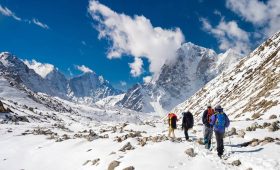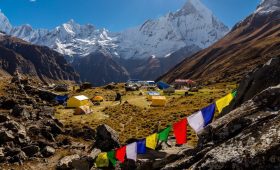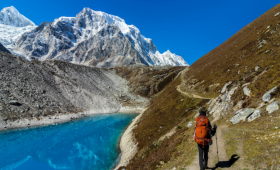If you enjoy the outdoors and nature, trekking is a great way to provide peace to your mind while getting great exercise. But, trekking can be physically draining and exhausting for beginners who want to get outdoors but don’t have much experience on the matter. So, maintaining your health and stamina is important inorder to enjoy any kind of hike or trek.
While proper gear is essential for a successful trek, your body needs constant attention and care to function properly and provide you with good energy and stamina to explore the world. In this blog post, we will discuss some tips on how to stay fit and healthy to fulfil your trekking wishes.
Cardio
Trekking requires a lot of physical strength, so it is necessary to keep your body healthy. Before your trek, you should consider cardio workouts in your everyday routine to challenge your body’s capacity for walking. These exercises include brisk walking, hiking, running, or cycling. These exercises will help you increase your stamina, and lung capacity which will make you more prepared for your upcoming trek.
Strength Training
Trekking involves carrying a backpack so that you can stay outdoors for a long time with everything you need for survival without having to return to the base. However, carrying a backpack means extra weight for your body to handle which requires building leg strength, arm strength, etc. that will help you carry the weight on your back. You should also include more strength exercises like squats, lunges, push-ups, and planks.
Hydration
During a trek, your body loses a lot of fluids through sweat and exhaustion, so hydration is very important. Water is always important even in daily life so of course it is extra important to stay more hydrated during a trek. You should carry a refillable water bottle and aim to drink at least 2-3 litres of water every day. You need to make sure to remain hydrated so you can also carry drinks that help you stay hydrated.
Nutrition
Eating is crucial during a trek. More importantly, a healthy and balanced diet is better for better health. While preparing for a trek, choose nutritious, high-energy foods that will fuel your body. Aim to carry energy-boosting foods such as granola bars, nuts, dried fruits, and snacks rich in protein and carbohydrates. And during your trek, aim to consume small, frequent meals to keep up your energy levels.
You can also carry some high-energy snacks such as bars or nuts to keep your energy levels up during your trek. Additionally, hydrating yourself frequently is important to avoid dehydration, which can lead to dizziness and fatigue.
Stretching and Relaxation
After a long day of trekking, the body may be tired, sore and stiff. Take the necessary time to stretch and relax before going to bed. Stretching helps you and your muscles to relax. You can also take relaxing beverages to help you relax and soothe your muscles.
5 Benefits of Maintaining Fitness For Epic Treks
Here are five benefits of maintaining fitness for epic treks:
1. Enhanced Endurance:
Long treks are challenging due to constant changes in altitudes. If you have a fit body, your endurance is automatically increased. It allows trekkers to navigate the path easier which reduces your chance of getting hurt in the steep ascents, and rocky paths. With improved cardiovascular fitness, trekkers can reach far and overcome obstacles without getting too tired to enjoy the destination.
2. Speedy Recovery:
Trails during a trekking adventure are physically demanding, which leads to sore muscles and fatigue. Trekkers who maintain their fitness levels can recover quickly. Regularly exercising provides them with muscular strength, flexibility, and overall great physical health during treks. It allows for more enjoyable and comfortable experiences on extended journeys.
3. Altitude Adaptation:
Treks might involve high-altitude regions where oxygen levels are low. A good cardiovascular system can handle itself better with reduced oxygen, which leads to altitude adaptation. Therefore, fit people are less likely to deal with altitude-related issues. It allows for more enjoyable and comfortable experiences on extended journeys
4. Injury Prevention:
Navigation during a trek can lead to injuries, especially on uneven paths and rocky landscapes. Regular exercise that includes strength training can make your muscles stronger and more stable with flexible joints, reducing injuries like sprains or twists. A strong body can handle the physical demands of trekking, leading to a safer and injury-free adventure.
5. Mental Resilience:
Physical fitness is linked to mental fitness. Regular exercise provides the release of endorphins, which leads to a positive mood and good mental health. Epic treks can be mentally draining and overwhelming. A fit person can handle stress, stay focused, and maintain a positive mindset throughout the trek, leading to an amazing trekking experience overall.
Conclusion
Trekking is a great way to explore nature and be fit and healthy, and with these tips, you will be well-prepared and ready for any trekking adventure. Just remember to take care of your body every day by exercising, eating well, and getting plenty of rest before your trip. During your adventure, staying hydrated and well-fed, practising good posture, and taking time to stretch and relax will help you recover faster and stay in shape.
A healthy trekking adventure is not only about reaching your destination but also about enjoying the journey and the scenery. So stay healthy and happy during your trekking adventure.




